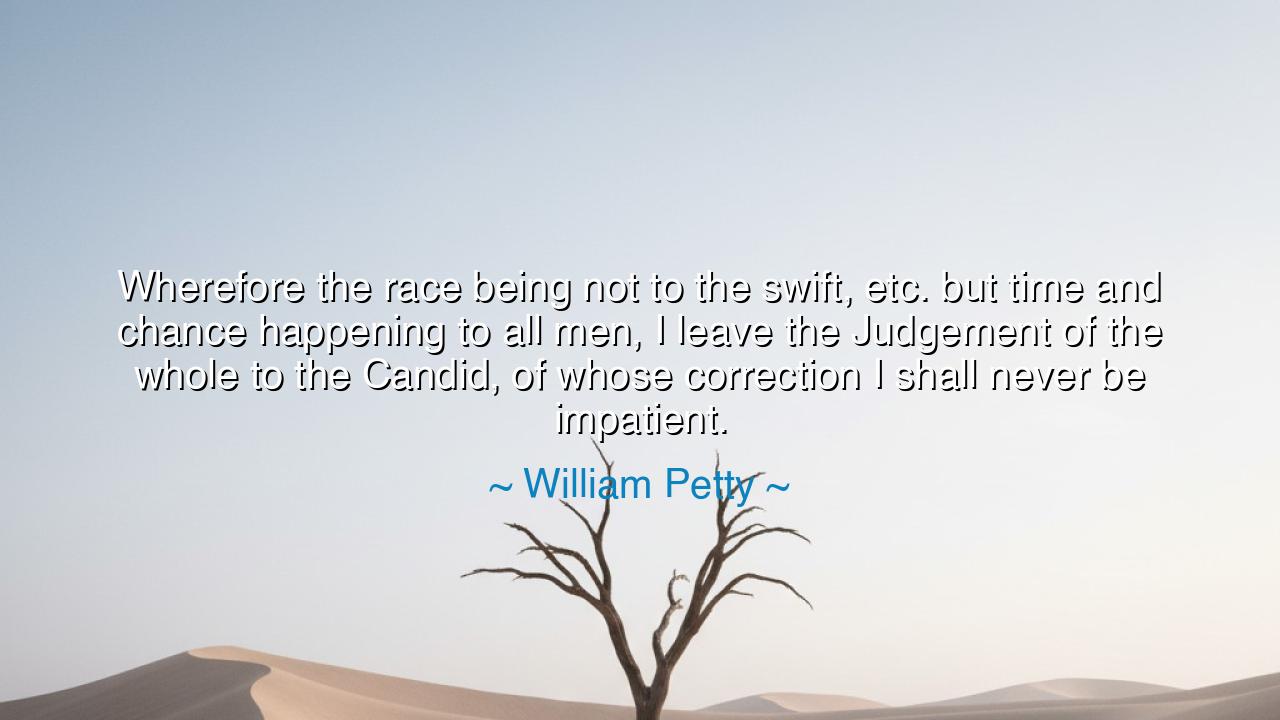
Wherefore the race being not to the swift, etc. but time and
Wherefore the race being not to the swift, etc. but time and chance happening to all men, I leave the Judgement of the whole to the Candid, of whose correction I shall never be impatient.






In the reflective words of William Petty, "Wherefore the race being not to the swift, etc. but time and chance happening to all men, I leave the Judgement of the whole to the Candid, of whose correction I shall never be impatient," we are invited to embrace the uncertainty and unpredictability of life, acknowledging that success and failure are not always determined by merit alone, but by time and chance—forces beyond our control. Petty, a 17th-century philosopher and economist, speaks of a profound truth: that life is not a simple race where the swiftest prevail, but rather a complex interplay of circumstance, fate, and opportunity. In this, he humbly accepts that his actions and outcomes will be judged by others, and he is willing to accept their correction with patience. His words speak to the humility of recognizing that external factors often shape our lives, and that judgment of our deeds should come from those with a clear and objective perspective.
This notion that success is not solely determined by ability or effort resonates deeply with the ancient philosophers, particularly the Stoics. Epictetus, one of the foremost Stoic thinkers, believed that fortune and chance play a significant role in the lives of individuals, yet it is how one responds to these forces that determines their true character. He wrote, "It’s not what happens to you, but how you react to it that matters." Petty echoes this Stoic idea: while time and chance shape our lives, it is how we accept and adapt to these forces that truly defines us. By acknowledging that external factors will influence outcomes, Petty demonstrates a Stoic attitude of acceptance and equanimity in the face of life's uncertainties.
This humility in the face of uncertainty also brings to mind the ancient Chinese philosopher, Laozi, who wrote in the Tao Te Ching, "A journey of a thousand miles begins with a single step." Laozi taught that the journey of life is not determined by forceful effort or rushing toward a goal, but by patience, acceptance, and mindful movement in the face of the forces that shape us. Petty's statement about leaving judgment to the Candid, or those who have the wisdom to see things clearly, reflects this same deep acceptance of the flow of time and the mysteries of chance. We are not always in control of the path we walk, but we can choose how we respond to the road before us.
Consider the story of Julius Caesar, whose rise to power was marked by his military genius, yet much of his success was due to the fortuitous circumstances that favored him. His crossing of the Rubicon and the subsequent Civil War were pivotal moments in Roman history, but these events did not unfold in a vacuum. Caesar was astute, yes, but his success also depended on factors outside his control—the loyalty of his men, the instability of Rome, and the opportunity to seize power when it arose. Like Petty, Caesar’s greatness was not solely due to his ability, but to the chance and timing that played such a vital role in his success. In the face of this, Caesar famously remarked, "Fortune favors the bold," acknowledging that chance and opportunity often provide the greatest keys to success.
The humble acceptance of external forces is also seen in the life of Abraham Lincoln, whose rise from humble beginnings to the presidency of the United States was shaped by not only his own resolve and wisdom, but by the turbulent times in which he lived. Lincoln’s election came at a time of immense national division, and much of his success in leading the nation through the Civil War was due to the timing and chance of historical events. Yet, Lincoln did not seek to control the forces of fate; he responded to them with patience, humility, and determination. His ability to navigate the forces of time and chance, to bend them toward a higher cause, reflects the very principle Petty speaks of: success is not determined by one’s speed or strength, but by how one engages with the circumstances life presents.
The lesson Petty imparts is a reminder that life is not always a matter of personal achievement alone, but also of humility in the face of fate and chance. Time and circumstance often play a far greater role in our lives than we are willing to admit. By embracing this truth, we open ourselves to the possibility of growth in unexpected ways. The Stoic philosophy teaches us that while we cannot control the events of life, we can control how we respond to them. Petty’s acceptance of being judged by the Candid is a testament to the wisdom of embracing the unpredictable forces of the world, knowing that our reaction to them shapes our ultimate character.
Thus, let us take action by accepting the unpredictable nature of life and recognizing that our achievements are not solely the result of our abilities, but of the circumstances that surround us. Just as Caesar and Lincoln navigated the tides of fate, let us acknowledge that timing, chance, and fortune often influence our journey. Stay humble in the face of success, and patient in times of hardship. By responding with wisdom, we too can transform life's random events into meaningful opportunities and, like Petty, leave judgment to the Candid, those who see beyond the surface and understand the deeper forces that shape our paths.






AAdministratorAdministrator
Welcome, honored guests. Please leave a comment, we will respond soon